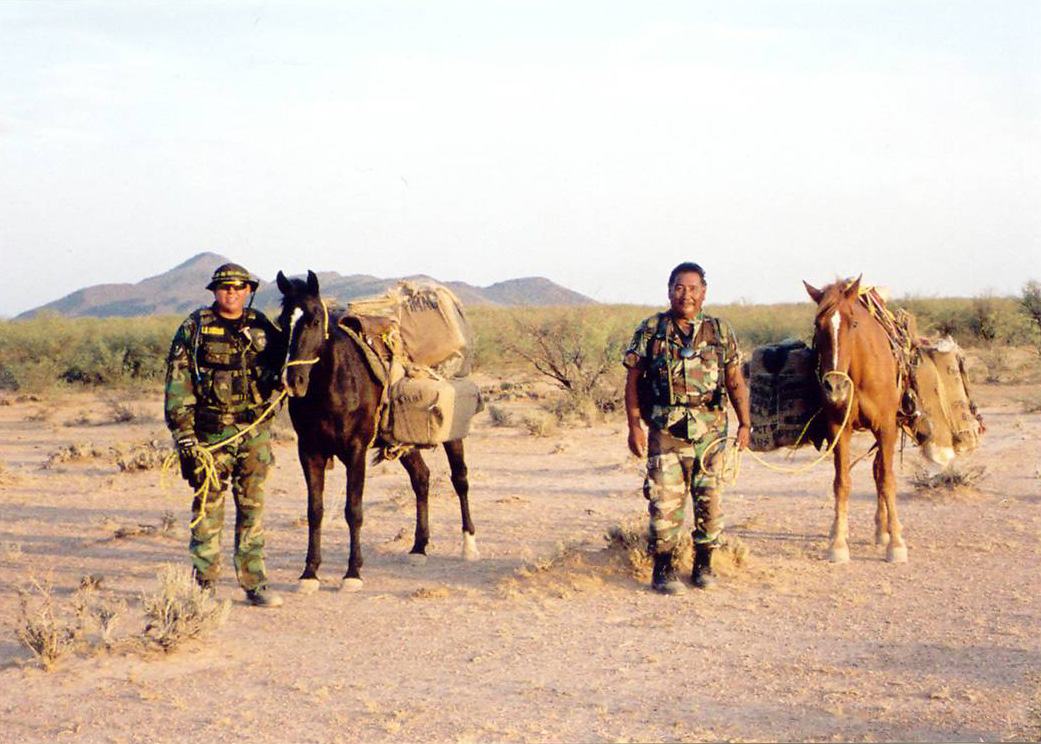
- Details
- By Levi Rickert
On Thursday, Senators Ruben Gallego (D-AZ) and John Hoeven (R-ND) reintroduced the bipartisan Shadow Wolves Improvement Act, aimed at bolstering border security and expanding opportunities for Shadow Wolves agents.
The legislation reclassifies Shadow Wolves as competitive service employees, enhancing their career mobility, improving retention, and facilitating the recruitment of new agents. While the bill passed unanimously through committee last September, it did not reach the Senate floor in time for final passage. The bill is also cosponsored by Senators Mark Kelly (D-AZ) and James Lankford (R-OK).
Shadow Wolves are a specialized unit of Native American trackers from the Tohono O’odham Nation who patrol a 76-mile stretch of the U.S.-Mexico border on Tribal land. Leveraging their deep geographical and cultural knowledge, they excel at tracking drug smugglers attempting to move illicit goods across the border.
Despite their crucial role in border security, Shadow Wolves do not currently have the same career advancement opportunities as other Homeland Security Investigations (HSI) special agents. This bill ensures they receive equal career mobility and compensation by allowing Immigration and Customs Enforcement (ICE) to transition Shadow Wolves from excepted to competitive service after three years. It also incorporates recommendations from the Government Accountability Office (GAO) to strengthen and expand the program.
“Arizona’s Shadow Wolves are invaluable in our fight against human trafficking and drug smuggling. It's about time they had the same benefits as other federal agents,” Sen, Gallego said. “This bill makes sure they get fair treatment, helps recruit and keep top talent, and helps builds a stronger relationship between DHS and Tribal communities so we can work together to keep our border communities safe.”
"The Shadow Wolves are an elite, all-Native American tracking and investigative unit with decades of experience in protecting the Tohono O’odham reservation and our border. Their unique skill set and deep knowledge of the land is invaluable to law enforcement in the area. The Tohono O’odham Nation strongly supports the Shadow Wolves Improvement Act to give our Shadow Wolves agents the support they deserve and preserve the Nation’s role in protecting our land,” said Verlon Jose, Chairman of the Tohono O’odham Nation.
“The Shadow Wolves have been an important and effective initiative for combatting drug trafficking in Indian Country. Securing the border must be a top priority, and it makes sense to build upon and expand this program to the northern border as part of our broader work to get control of our nation’s borders,” Sen. Hoeven said. “That means empowering border professionals, like the Shadow Wolves, to enforce the law and giving them the tools and resources needed to stop traffickers from smuggling drugs and people into the U.S.”
The Shadow Wolves Improvement Act builds upon the Shadow Wolves Enhancement Act, signed into law by President Biden in 2022, which reclassified Shadow Wolves as special agents with full authority to patrol, investigate, and secure the border.
More Stories Like This
Native News Weekly (August 25, 2024): D.C. BriefsUS Presidents in Their Own Words Concerning American Indians
Federal Judge Orders ICE to Halt Use of Pepper Spray, Arrests of Peaceful Protesters in Twin Cities
Tunica-Biloxi Cultural Leader John D. Barbry Walks On
Next on Native Bidaské: Federal ICE Activity in Minneapolis: Ruth Buffalo’s Perspective
Help us defend tribal sovereignty.
At Native News Online, our mission is rooted in telling the stories that strengthen sovereignty and uplift Indigenous voices — not just at year’s end, but every single day.
Because of your generosity last year, we were able to keep our reporters on the ground in tribal communities, at national gatherings and in the halls of Congress — covering the issues that matter most to Indian Country: sovereignty, culture, education, health and economic opportunity.
That support sustained us through a tough year in 2025. Now, as we look to the year ahead, we need your help right now to ensure warrior journalism remains strong — reporting that defends tribal sovereignty, amplifies Native truth, and holds power accountable.
 The stakes couldn't be higher. Your support keeps Native voices heard, Native stories told and Native sovereignty defended.
The stakes couldn't be higher. Your support keeps Native voices heard, Native stories told and Native sovereignty defended.
Stand with Warrior Journalism today.
Levi Rickert (Potawatomi), Editor & Publisher


